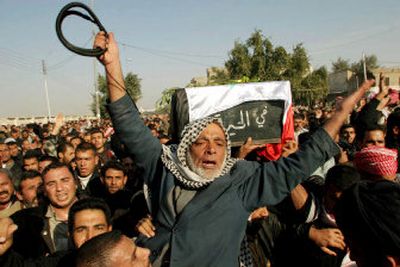Top al-Sadr deputy slain, clouding political outlook

BAGHDAD, Iraq – A top deputy of Shiite cleric Muqtada al-Sadr was killed Wednesday during a raid by U.S. and Iraqi troops in the southern holy city of Najaf, sparking protests from al-Sadr’s followers and complicating an already tense relationship with the powerful anti-American leader.
Hurling rocks and shouting expletives, thousands of angry al-Sadr loyalists marched through the streets of Najaf after Sahib al-Amiri was shot and killed by an American soldier during an early morning raid. “Agents and stooges!” protesters shouted at Iraqi soldiers and local authorities.
U.S. military officials declined to confirm that al-Amiri was an al-Sadr aide, saying only that he had provided explosives for use against Iraqi and American forces. Al-Sadr officials said al-Amiri was an aide, and also a lawyer who ran an educational organization that helped orphans and impoverished children. They said he had no connections to illegal activity.
In a statement, the U.S. military said Iraqi and American forces were trying to detain al-Amiri and only shot him when he pointed an assault rifle at an Iraqi soldier.
The incident comes at a delicate time for the Iraqi political process. Al-Sadr, who runs one of the country’s most feared militias, is also a potent political force; his allies control 30 seats in parliament and four key ministries. Last month, influential politicians linked with al-Sadr suspended their participation in the government to protest a meeting between Prime Minister Nouri al-Maliki and President Bush in Jordan.
Unable to pass legislation without al-Sadr’s support, and fearing Iraq’s government could collapse, other Shiite leaders have been appealing for an to end to the boycott.
The raid also complicates matters for al-Maliki, a Shiite who is politically beholden to al-Sadr and has been criticized by U.S. officials for not doing enough to rein in al-Sadr’s Mahdi Army militia.
On Wednesday, al-Maliki asked senior U.S. commanders to explain the motive for Wednesday’s raid, advisers to the prime minister said. One adviser, speaking on condition of anonymity, said al-Maliki has set up a committee to investigate the incident, underscoring his concern that the raid could trigger violence and dissuade al-Sadr from political engagement.
Major Gen. William Caldwell, the top U.S military spokesman in Iraq, told reporters in Baghdad that the raid was led by 35 soldiers from the 8th Iraqi Army Division Forces with eight U.S. troops serving as advisers.